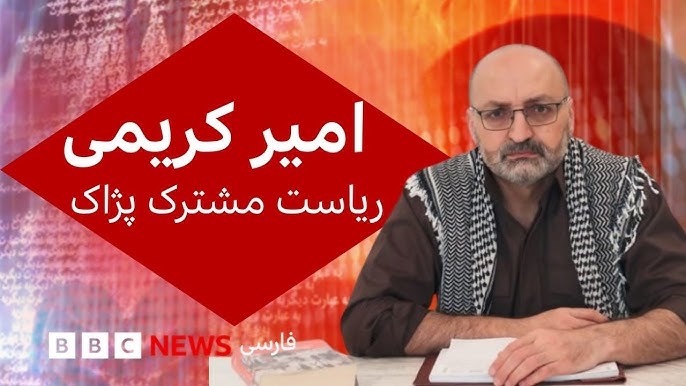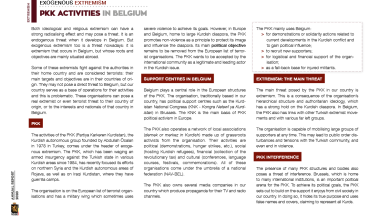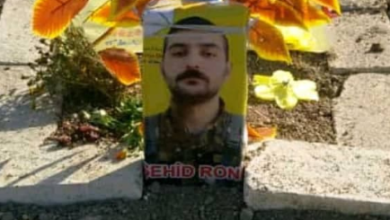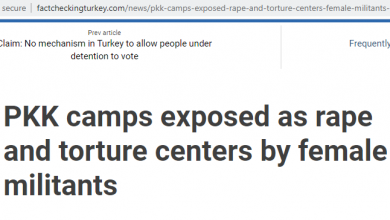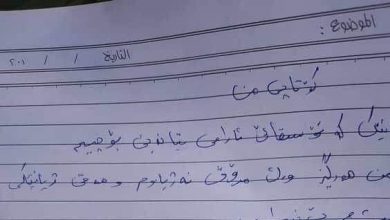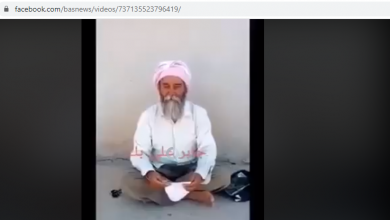Has the BBC Crossed Media Red Lines?
On Monday, BBC Persian broadcast a rare report from inside the tunnels of the armed group PJAK. This group stands accused of the systematic use of children as soldiers, enforced disappearances, and violent armed operations. Considered the Iranian branch of the terrorist group PKK, PJAK is listed as a terrorist organization by Iran. The crucial question remains: Why were none of the human rights violations or child rights abuses raised in the interview with PJAK’s co-chair? Is the BBC Persian correspondent unaware of this group’s armed nature? Or is the report intended to support an armed group?
In one of the few on-the-ground reports from inside PJAK strongholds, BBC Persian and senior correspondent Zhyar Gol gained access to the group’s tunnels in the border mountains between Iran and Iraq, conducting an exclusive interview with Amir Karimi, PJAK’s co-chair. This report aired on July 21st on BBC Persian’s “60 Minutes” program and sparked widespread reactions. PJAK is the Iranian branch of the Kurdistan Workers’ Party (PKK), which is listed as a terrorist organization by the United States, the European Union, and Turkey. The PKK and its various branches, including PJAK, have been accused of systematic human rights violations, particularly the use of children in their military structure.
It’s regrettable that the BBC correspondent used the term “Kurdish parties opposing the Iranian government” to describe PJAK, claiming this armed group “has the largest armed force in the mountainous border regions of Iraqi Kurdistan with Iran.” However, the BBC Persian correspondent doesn’t explain how an armed group can be described as a party, or which political party possesses armed forces, tunnels, and maintains its headquarters in the heart of difficult mountainous roads! In Zhyar Gol’s report, Kurdish armed groups are repeatedly referred to as “parties,” immediately followed by the qualifier “armed”! Indeed, it remains unclear how one can simultaneously be a party and an armed group.
The Children Who Aren’t Pictured
One of the most prominent criticisms of this report is the complete absence of any questions regarding PJAK’s use of child soldiers. According to numerous reports, including documents published by human rights NGOs, the United Nations, and independent regional bodies, PJAK has recruited hundreds of adolescents into its training camps in recent decades. These claims are substantiated by images published by PJAK and PKK websites showing their fallen combatants. It is abundantly clear that many of these individuals were underage at the time of their recruitment into PJAK and, according to international law and the Convention on the Rights of the Child, should not be used as soldiers. Furthermore, it’s crucial to note that PJAK, in a new policy, no longer publishes the dates of individuals’ recruitment on its website to avoid accusations of using and recruiting children. PJAK had, in fact, pledged in an agreement in Geneva to cease using children as soldiers—a pledge that, according to Iranian Kurdistan Human Rights Watch, has not only been violated but is contradicted by new evidence indicating the continued recruitment of children in recent years. In essence, a crucial point must be made: “The fact that a group pledges to no longer commit war crimes and use children as soldiers is itself a tacit admission of past wrongdoing. The question now is: Why did the BBC correspondent make no mention of this reality?”
Enforced Disappearances: The Silence
Another issue conspicuously absent from the BBC Persian report was the enforced disappearance of children and adolescents within the PJAK structure. For years, many Iranian and Iraqi Kurdish families have remained unaware of the fate of their children, who were either recruited or abducted by PJAK. PJAK neither acknowledges their deaths nor allows families to meet with their children. In some cases, PJAK releases brief news, claiming a member of the group, for example, was killed in 2019! This means PJAK sometimes publishes news of its members’ deaths several years later. Even with the announcement of death, the cause of death, burial place, and other details remain unclear. This is despite the “International Convention for the Protection of All Persons from Enforced Disappearance,” which deems this phenomenon a crime against humanity. Yet, in the broadcast report, not only were no questions raised on this matter, but the overall tone of the report presented PJAK as a legitimate armed force in the mountains, without the slightest mention of its dark history.
In his interview with PJAK’s head, Zhyar Gol asked no questions about the fate of dozens of Iranian Kurdish women who have disappeared and died within PJAK. This is particularly significant given that PJAK’s head, in the same interview, claimed to advocate for women’s freedom. PJAK’s head asserted that his group is a struggling political movement that believes in democratic solutions. However, Amir Karimi did not explain how using children and women as soldiers, operating from tunnels, engaging in armed actions, and disappearing Iranian Kurdish citizens contributes to a democratic resolution of the Kurdish issue in Iran. The interview with Amir Karimi primarily focused on PJAK’s leader’s narrative and scarcely addressed dissenting views or criticisms of the group.
Has the BBC Crossed Media Red Lines?
Iranian Kurdistan Human Rights Watch explicitly calls on the UK media regulator, Ofcom, to investigate BBC Persian’s conduct. According to sections 5 and 7 of Ofcom’s “Broadcasting Code,” public broadcasters are obligated to maintain impartiality, balance, and factual accuracy in covering sensitive issues and must not provide a platform for direct or indirect promotion of violence or terrorism. Furthermore, according to section 5.1 of “Ofcom’s Code of Principles,” broadcasters must act accurately and fairly in presenting information. Interviewing PJAK representatives without presenting opposing viewpoints or explanations about the group’s history constitutes a kind of imbalance in information delivery. This imbalance can mislead audiences and present a distorted picture of the existing realities.
Certainly, the BBC Persian correspondent is aware of PJAK’s history of terrorist attacks in Iran and its use of children and women as armed combatants. Therefore, it must be emphasized that turning the BBC’s camera into an unquestioning, one-sided platform for a group with a history of armed violence and war crimes is unprofessional behavior and contrary to media responsibility. A media outlet funded by the British public must operate with the highest level of transparency and accountability, not produce promotional reports for an armed group and promote its armed actions. One of the serious weaknesses of this interview was the lack of balance in covering various topics. While PJAK’s head outlined its goals and activities, the BBC did not adequately address the challenges and criticisms facing the group.
In response to the broadcast of this report, Iranian Kurdistan Human Rights Watch demands the following:
- Immediate investigation of BBC Persian’s actions by Ofcom regarding violations of public broadcasting laws and indirect promotion of an internationally prosecuted armed group on the list of terrorist organizations!
- Official accountability from BBC Persian regarding the reasons for excluding human rights issues from the interview with PJAK leaders.
- A stance from the British government concerning financial support for a media outlet that, in practice, has created a promotional platform for a group with a serious human rights record.
- International action regarding PJAK’s violation of the Geneva commitment and the initiation of independent investigations into the recruitment of children and the fate of those disappeared within this group.
The airing of this report has not only questioned professional media standards but has also caused deep concern among child rights organizations and human rights activists. Silence in the face of proven crimes, especially on a state-funded network, cannot go unanswered. Iranian Kurdistan Human Rights Watch calls on all international media, regulatory bodies, and human rights organizations to consider this behavior a credibility test for the Western media system. This is not the first time BBC Persian has become a one-sided platform for PJAK. In 2023, Zilan Vejin, a PJAK leader, also admitted in an interview with Zhyar Gol to the organizational connection between the PKK and PJAK and Ocalan’s leadership over the entire structure. PJAK, as a group known for its history of violent and terrorist acts, must be subjected to thorough scrutiny and criticism. Interviewing the head of this armed group without considering its history and activities could lead to the normalization and, in a way, legitimation of their illegal and violent actions.

